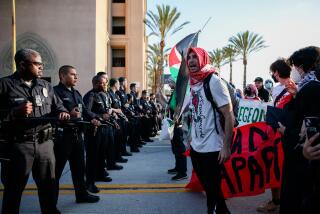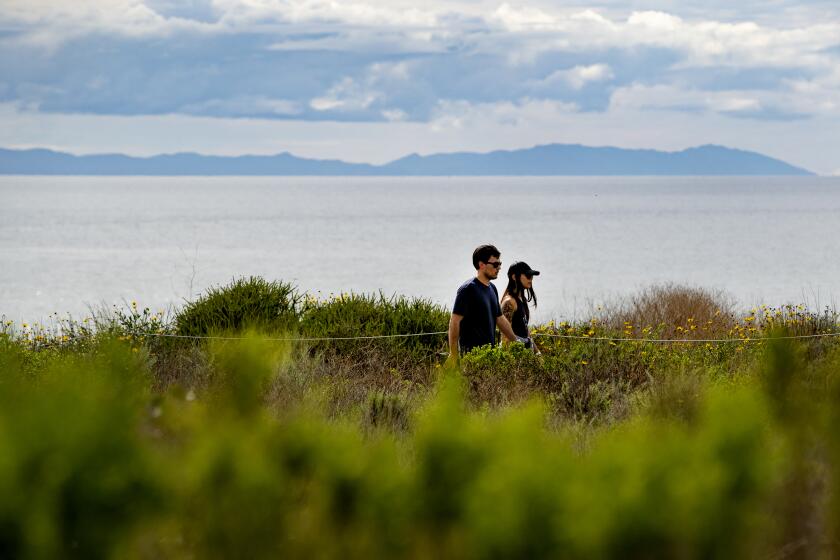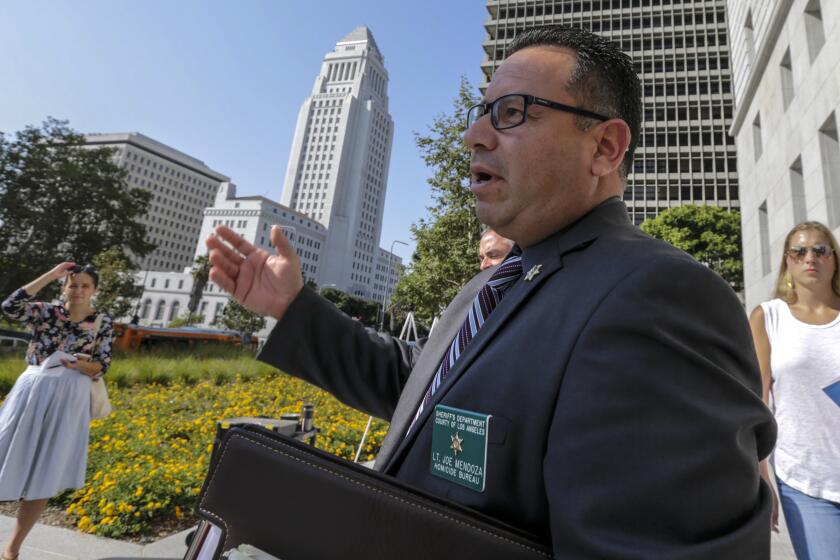Bias Ruling Against FBI Favors Gay Agent : Law Enforcement: Judge refuses to dismiss lawsuit by Frank Buttino, who was fired after 21 years of service.
The Federal Bureau of Investigation has an “undisputed” history of discriminating against gay employees, a federal judge in San Francisco has declared in a legal ruling favorable to Frank Buttino, an agent for 21 years who said he was fired in 1990 from the San Diego office because he is gay.
In an unusually candid 23-page decision denying the FBI’s motion to dismiss Buttino’s suit, U.S. District Judge Saundra Brown Armstrong said the former agent “has submitted evidence--and indeed it is undisputed--that the FBI has had a history of anti-gay discrimination.”
Buttino, 47, fired by the FBI in June, 1990, said the bureau began questioning him about his homosexuality in August, 1988, after someone sent the FBI a personal letter Buttino wrote to a friend describing sexual activities.
At first, Buttino denied responsibility for the letter, fearing that he would lose his job, but after being called to Washington five weeks later, he admitted he was gay.
By September, 1989, the FBI proposed that his security clearance be revoked, a move made permanent in January, 1990. Buttino appealed the decision to the U.S. Justice Department, which upheld the FBI’s decision in May, 1990. Because all FBI employees must have security clearance, Buttino lost his job in June, 1990.
Justice Department attorneys have argued that the FBI has no policy against hiring gays nor does it discriminate today. They have asked Armstrong to reconsider her decision.
D. Jerry Rubino, a Department of Justice security officer who upheld the FBI’s decision to revoke Buttino’s security clearance, has said in a written declaration that he did so because Buttino “placed himself in a position that may have subjected him to coercion or pressure,” lied when the FBI questioned him about his homosexuality and refused to fully cooperate with the investigation.
Despite Rubino’s statement, Judge Armstrong ruled that Buttino presented “ample evidence from which a reasonable jury could infer . . . the existence of anti-gay bias within the FBI generally and the effect of such bias on the investigation into, and the decision regarding, (Buttino’s) continued fitness for a security clearance.”
FBI officials acknowledged that they investigated the possibility that Buttino was a security risk after learning that he was gay.
“One reasonable inference,” Armstrong wrote, “is that the FBI would not have considered information that a highly commended 20-year special agent ‘engaged in heterosexual activity’ grounds to undertake an investigation into his continued fitness for a security clearance.”
Buttino joined the FBI in 1969 and worked criminal and foreign intelligence, specializing in terrorism, organized crime, espionage and Chinese affairs. In 1989, he was one of three agents in charge of investigating the bombing of a van owned by Navy Capt. Will Rogers III. In 21 years, he received four commendations and several cash bonuses.
Throughout the legal proceedings, Buttino said he and his attorney, Richard Gayer of San Francisco, have offered to drop the lawsuit if Buttino is reinstated with all benefits and if the bureau refrains from discriminating against gays.
The offer was made as recently as this month, after Armstrong’s Feb. 11 ruling.
“The FBI has given us an indication that there is no way that they are going to give me my job back,” Buttino said. “And I don’t know why because we’ll just go ahead to trial. I will not settle out of court.”
Before then, Buttino and Gayer want Armstrong to certify their case as part of a class-action suit they hope to bring against the bureau.
“Right now, we know of 20 to 25 people in the past five years who were fired or pressured to resign because they were gay,” Gayer said.
As part of his legal arguments to support assertions that the FBI still discriminates, Buttino and Gayer referred to a 1979 bureau case heard before a federal appeals court in the District of Columbia.
In the hearing, the FBI stated that it “has always had an absolute policy of dismissing proven or admitted homosexuals from its employ.” Four years ago, a circuit court in the District of Columbia found that the FBI had still been discriminating against gays and that the agency had “no plans to change (its) policy regarding homosexuals.”
Three former FBI workers, as well as one who still works for the bureau and one who was rejected for a job all have submitted declarations that “evidence the FBI’s extensive inquiries into specific private sexual acts and the exploration of childhood sexuality,” Armstrong wrote.
FBI investigators also asked for names of other gay employees, who received threats urging them to resign or risk being fired, the declarations say. The assertions are supported by internal FBI files, Armstrong said.
“The court has questions as to the rationality of a policy which punishes gay employees for being less than candid about their homosexuality when it is undisputed that at least until very recently, the FBI would clearly have purged any employee for being candid about one’s homosexuality,” she wrote.
Armstrong questioned why the FBI has refused to reinstate Buttino, when others who have lied in the course of their jobs have received far less serious punishments, such as probation or suspension.
“The court has serious questions as to the rational basis for a policy which does not permit the reinstatement of a gay Special Agent (whose 20-year record is unblemished but for a short-lived deception regarding his homosexual activities),” Armstrong wrote, adding that Buttino has “expressly given the FBI ‘unrestricted permission’ to tell anybody it wants about his sexual orientation and sexual activities.”
More to Read
Start your day right
Sign up for Essential California for news, features and recommendations from the L.A. Times and beyond in your inbox six days a week.
You may occasionally receive promotional content from the Los Angeles Times.






